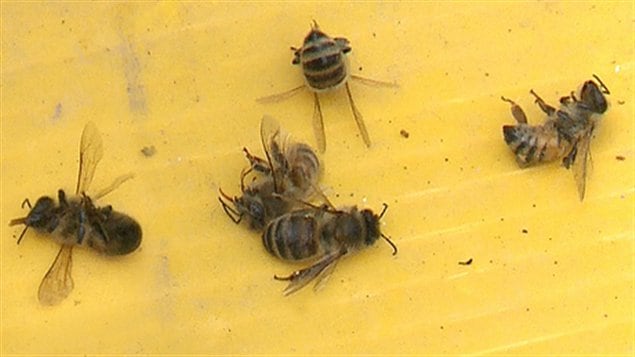Bees are dying off in massive numbers around the world. Here in Canada, a farmer in Elmhurst, Ontario witnessed the death of his 37 million bees. That was two weeks ago. Now he is in danger of losing his farm.
The decimation of the bee population will wreak havoc on the world’s already taxed agricultural systems. Bees, and other pollinators, ensure most fruit and vegetable crops mature into food. According to the Canadian Honey Council, the bee population dropped by 35 per cent over the last three years.
The problem is most acute in the provinces of Ontario and Quebec. This week Kathleen Wynne, Ontario’s premier and the provinces’ minister of agriculture, took action by forming a working group to study bee health. It brings together beekeepers, agricultural scientists, farmers and the pesticide industry.
Experts disagree, some blaming mites, others say the deaths are due to the use of pesticides, known as neonicotinoids, which have been in use in Canada since 2004.
Ernesto Guzman, a bee researcher at the University of Guelph, said in a recent interview with CBC, “We have evidence that Varooa mites are problem No. 1 associated to bee mortality, but admitted he had not studied the effect of neonics on bees.
The pesticide theory suggests that bees are exposed during the corn planting in the spring. The corn seeds are coated in the pesiticide, and the dust that is created in the process of sowing the seeds is carried off into the air harming bees.
At the University of Laval, in Quebec, entomologist Val Fournier supports the pesticide argument. She said when she sampled water from puddles in fields two to three weeks after they were planted with neonicotinoid-treated corn, she found levels of neonicotinoids 10 times higher than what is known to cause death.
The EU, which is experiencing similar bee mortality rates, banned neonicotinoid pesticides in April, but for now Canada contiues to study the trend.
Carmel Kilkenny spoke with John Bennett, Executive Director of the Sierra Club.







For reasons beyond our control, and for an undetermined period of time, our comment section is now closed. However, our social networks remain open to your contributions.